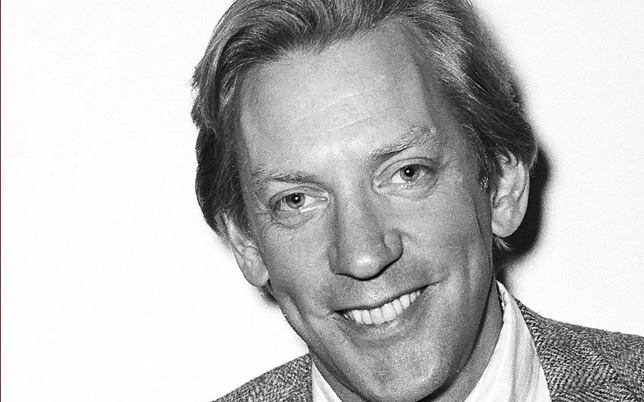
- Industry
Donald Sutherland
Donald Sutherland was born in Saint John, New Brunswick, Canada on July 17, 1935. He studied at the London Academy of Dramatic Arts and acted in British films until he was cast in The Dirty Dozen (1967) by Robert Aldrich, then moved to Hollywood, where he became a symbol of the counter-culture with films like M*A*S*H (1970) by Robert Altman, Alex in Wonderland (1970) by Paul Mazurski, Kelly’s Heroes (1970) with Clint Eastwood, Start the Revolution Without Me (1970) with Gene Wilder. After co-starring with Jane Fonda in Klute (1971) by Alan Pakula, he joined her in a
1970 tour of U.S. army bases performing the satirical review F.T.A. (Free/Fuck the Army) opposing the Vietnam War.
Throughout the 1970s and 1980s Sutherland worked with European directors, like Nicolas Roeg in Don’t Look Now (1973) with Julie Christie, John Schlesinger in The Day of the Locust (1975) from the novel by Nathanael West, Federico Fellini in Casanova (1976), Bernardo Bertolucci in 1900 (1976), Claude Chabrol in Blood Relatives (1978), Richard Marquand in Eye of the Needle (1981), Louis Malle in
Crackers (1984). He was particularly fond of Fellini, as he told the journalists of the Hollywood Foreign Press in 1980: “Fellini would treat me like a little child or a concubine. I was his darling Donald and he had a very seductive way about teasing you. I fell for it like a lump of bricks and working with him was the happiest year I’ve ever had.” Sutherland also worked with John Sturges in The Eagle Has Landed (1976), Philip Kaufman in Invasion of the Body Snatchers (1978), Robert Redford in Ordinary People (1981), Euzhan Palcy in A Dry White Season (1989), Robert Towne in Without Limits (1989). He admired Redford’s work in his directorial debut, “Bob Redford was as intelligent and observant a director as I’d ever worked with. He trained as a painter and he had a very specific picture in his head of what he wanted, from his background as a painter, he has a wonderful sense of image.”
Sutherland loved working with Marlon Brando in A Dry White Season, as he told HFPA in 1989: “He is not only a genius as a performer, he’s a genius as a person. He has one of the most elegant minds I’ve ever had the pleasure to encounter, filled with immense resources of observation, literary comparisons, comprehension and sensibility. Marlon Brando is like a John Keats’ poem, he’s exquisite.” His real-life hero is the Canadian doctor Norman Bethune, as he said to HFPA, “He created MASH (Mobile Army Surgical) hospitals for blood transfusion at the front lines during the Spanish Civil War, he died in China in 1939, where he revolutionized Chinese medicine in the 1920s and 30s, he fought alongside Mao Zedong and became a hero of international communism. He was a drunken renegade and a rabble-rouser, and I loved him.” Sutherland portrayed him twice on TV, in Witness to Yesterday (1974-75) and Bethune (1977), and in a movie he produced, Bethune: The Making of a Hero (1990).
Sutherland named his sons after film directors. Kiefer, born in 1966 with his twin sister Rachel, from his second wife Shirley, was named after Warren Kiefer, director of his first film Castle of the Living Dead (1964). His 3 sons with his partner of over 40 years, the French-Canadian Francine Racette, are Roeg, born in 1974, named after Nicolas Roeg (Don’t Look Now 1973), Rossif born in 1978, after his friend Frédéric Rossif, Angus Redford, born in 1982, after Robert Redford (Ordinary People 1981). Sutherland is very proud of his son Kiefer’s accomplishments as an actor, as he told HFPA in 1989, “I’m immensely proud of him and I love him passionately. He comes home and he talks to me like his friend, his lover, and his father.”
A workaholic who confessed to HFPA in 1980, “I got into the habit of working 5, 6 days a week, 52 weeks a year,” Sutherland has made over 150 movies, including JFK (1991) by Oliver Stone, Six Degrees of Separation (1993) by Fred Schepisi from the play by John Guare, Disclosure (1995) by Barry Levinson from the novel by Michael Crichton, Outbreak (1995) by Wolfgang Petersen, A Time to Kill (1996) by Joel Schumacher from the novel by John Grisham, Cold Mountain (2003) by Anthony Minghella, Fierce People (2005) by Griffin Dunne, Pride and Prejudice (2005) by Joe Wright from the novel by Jane Austen, Fool’s Gold (2008) by Andy Tennant. He is now playing President Snow in The Hunger Games movies, and he loves the political implications of the young adult trilogy by Suzanne Collins. “It’s not The Battle of Algiers (by Gillo Pontecorvo 1966), it’s not as succinct as Paths of Glory (by Stanley Kubrick 1957), but in this day and age it can be a motivating force for young people, who have been dormant in terms of their political activity, except for those who got involved with the Occupy movement last year.” The Hollywood Foreign Press awarded Donald Sutherland 2 Golden Globes for his work on television, in Citizen X (1996) and Path to War (2003) and 6 nominations for M*A*S*H (1971), Ordinary People (1981), Without Limits (1999), Human Trafficking (2006 TV), Commander in Chief (2006 TV), Dirty Sexy Money (2008 TV).

